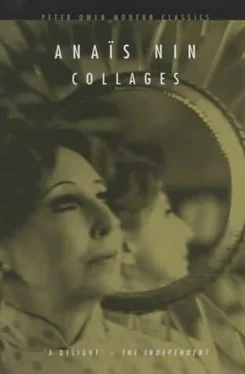And so, Doctor Mann, in the same fast liquid monologue she had set down, picked up his own story in Siberia where he had been sent for rebellion against the regime, and where there was nothing to nourish him except books; where his faith in woman’s intuitive knowledge had made him translate Judith Sand’s book into Hebrew; from there to his American wife and children in a modern apartment in Israel and his work with a newspaper which put him in touch with all the plays and books being written.
“You know, my dear Judith Sands, I am not here to frighten you, or violate your privacy. I am not a man visiting a woman. I am a man with a profound love of words. In the words of the Talmud: ‘Kaka tuv… It is written.’ I know you do not like strangers; but, just as you are no stranger to me, I cannot be a stranger to you because I feel that, in a sense, you gave birth to me. I feel you once described a man who was me before I knew who I was, and it was because I recognized him that I was able to be myself. You will recognize me when you see me. I am sure you have already recognized how I think; this mixture in me which makes me feel my way through experience as women do, and yet talk even when I do not wish to talk like an intellectual, a scholar (which is mockery as I do not believe that they know as much as the poet in his delirium). I have grown grey hairs waiting to meet you. I could not find your address or anyone who knew you. Then a taxi driver told me he had just driven uptown a woman who talked as I did, with a man with an English accent, and he said they were going to the opening of his cocktail party; and then I knew you were in New York and had been with T. S. Eliot. Every word you wrote I ate, as if it was manna. Finding one’s self in a book is a second birth; and you are the only one who knows that at times men behave like women and women like men, and that all these distinctions are mock distinctions, and that is why your doctor put on a wig when he wanted to talk about his loves, and I don’t know why Thomas Mann wrote about Transposed Heads for there are other transpositions of far greater interest, and your story is the most accurate in the world.”
No answer.
But there was a creak of a chair, and a soft footstep on the floor behind the door.
Doctor Mann added: “I am leaving my gifts to you on the door mat. I hope you like champagne.”
“I don’t drink,” said a low, deep voice behind the closed door.
“Well, you can offer it to your friends. Tomorrow I fly back to Israel at nine in the evening, I will come again at five o’clock. Perhaps you will open your door to a man who is going away. And you will see I am no stranger. Remember this, it is good for a writer to meet with the incarnation of a character he has invented. It gives him an affirmation, a substantial proof of his intuitions, divinations. Here I stand before you, talking as you said I might, and reminding you that what may have seemed a ghost in a dream, in your smoke-filled heart at night, is a man who got his knowledge and his degrees from books in a cell in Siberia, and who translated you by the light of a candle.”
“Come back tomorrow. We’ll have coffee together,” said the voice.
The next day he came. But there was no answer to his knock and so he began his monologue: “When you deny me the presence of a writer, you really deny me a part of myself that has not yet been born, and whose existence I need to believe in. I always wanted to be a writer, but I talk too much, it evaporates, or it may be I have not yet decided whether to write as a man or as a woman. But you have been my writer self writing for me. I could talk wastefully, negligently, only because you were there preserving and containing my spirit. When you deny me your presence, you commit spiritual murder, for if I have been for years talking with your words, spending them lavishly, extravagantly, it was only because I believed I could always renew myself at the source. You may feel this was an imposition. No one should be forced to carry the unfulfilled self of another. But if you are so skilled with words and have already written me, in a sense you have stolen me , and must return what you stole. You must come out and say: ‘I will go on writing for you. I will be your articulateness. I gave birth to you and I must grant you the fullest expansion of speech.’ And you need me, Judith Sands. You must not stifle yourself behind closed doors. Solitude may rust your words. Silence is not your element. It will asphyxiate you. We need each other! We are indispensable to each other. I to your work and you to my life. Without me spending your words you may not be incited to mint new ones. I am the spendthrift and you the coiner. We cannot live completely apart. And if I speak your character on perhaps a lower key than you had intended, even perhaps with a few false notes, it is because I have never met a writer with perfect pitch. If you refuse to talk to a plain man like me, your ambiguities will become intolerably tenuous, like the end of your book, which I do not understand.”
The door opened halfway. Judith Sands appeared shadowed against the light. Behind her, a chaotic lair, undistinguishable objects in wild disorder. She closed the door upon her cavernous dwelling and gave Doctor Mann her strong, firm hand.
“I am not absolutely certain of the meaning of that end to my book, but I am sure of one thing, that human beings can reach such desperate solitude that they may cross a boundary beyond which words cannot serve, and at such moments there is nothing left for them but to bark .”
As they walked together Doctor Mann asked: “Is it true what they say that you have written another book, that you keep it hidden in cartons, under your bed, that no one has read it?”
“Yes, it is true.”
“Why won’t you let it be read, published? It will shatter your solitude.”
“No, it will only aggravate it. The more they read of me, the louder they deny my existence, the existence of my characters. They say I have only described unique specimens.”
“But I can show you how these specimens reproduced themselves. They are scattered over the world. I will take you to the places where I know your book is a perpetual house guest, always sitting in the library, a guest of honor. You will only meet those who nourished themselves on it, the descendants of your characters.”
Doctor Mann observed how carefully Judith Sands had sought to efface in herself all traces of having been the woman once so wildly loved in her own novel. She had created a neutral appearance, wearing colors one would not notice nor remember, anonymous clothes, a cape which concealed the lines of her body, a Tyrolian hat with a feather on it. The feather, however, had retained its impertinence, from the days when she won every tournament with her wit.
“Solitude,” said Doctor Mann, “is like Spanish moss which finally suffocates the tree it hangs on.”
“Don’t you think I have thought of that whenever someone slips a piece of paper under my door saying ‘I love you Judith Sands’; don’t you think I ask myself is this another come to love me and also destroy me? Another one staying out all night and with each step away from me wearing out the soles of my heart with waiting? Or another come to steal my own image of me and expose it to the world, distorted of course? Or another come to resuscitate parts of me which I have already buried?”
“But you and those you loved have children scattered all over the world. They are descendants in direct line from your creations. Aren’t you curious about them?”
“How does one find them?”
“You can fly now and pay later. Jet by Alitalia, Bonanza, Lan Chile, the Comet Service, the Flying Tiger, Slick Airways, El Israel, Futura. You have your choice of names. Oh, I forgot the Pink Cloud Flights. We will visit only those who kept your book on the top shelf hidden from their parents, those who read it in other languages, in Dutch, Italian, German, Japanese, Yugoslavian, Hungarian, Russian, Flemish; those who read it and pretended they never heard of it but proceeded to live their lives oriented by its flow; those who succumbed to its contagion and searched for a similar atmosphere as if it were the only air they could breathe in; those who fell in love with your characters and searched for their counterparts. Those who quoted it to each other as a password to enter a unique and exclusive world. We will only go where your book is a part of the furniture.”
Читать дальше












